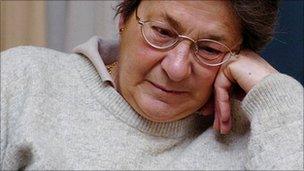Swiss vote to continue assisted suicide
- Published
- comments

Anne Turner was among those to travel to the Dignitas clinic
The result was decisive: by a margin of four to one, voters in the Swiss canton of Zurich rejected calls to ban assisted suicide for non-residents.
In the past decade more than 150 Britons have died with the help of the Swiss organisation Dignitas, external.
But that may not be the end of the matter. In the near future the federal Swiss government is to issue new proposals to tighten the law surrounding the operation of a number of suicide organisations.
There is unease among many in Switzerland that Zurich has become a destination to die - what has been dubbed 'suicide tourism'.
In the UK, the Swiss referendum vote was welcomed by the campaign group Dignity in Dying, external while the anti-euthanasia alliance Care not Killing said it was disappointed by the result.
The reality is that neither side will be completely content with the vote.
Care not Killing, external has consistently spoken out against the practice of assisted suicide.
Dignity in Dying wants terminally ill patients with a few months to live to be allowed to get help to die in Britain.
The organisation is not connected to Dignitas and is uneasy about its lack of regulation and its practices, such as accepting people who are not terminally ill.
Assisted dying is a huge ethical issue which provokes strong feelings.
Those opposed to a change in the law worry that a right to die could turn into a duty to die, placing pressure on the elderly and vulnerable to seek death.
Those in favour argue that it is a mark of a civilised society to allow people to be helped to die if they are suffering.
If the Swiss had voted to ban foreigners from coming to Zurich to die then it would have catapulted the issue into the news and prompted a fresh debate.
So assisting a suicide continues to be a criminal offence here, but none of the families of those who have travelled to Zurich to die have faced charges.
The Swiss referendum means that this situation will continue.
Some will regard this as the UK turning a blind eye to a difficult ethical issue while others will say it is a sensible approach.